Ever mixed up “propose” and “purpose” and ended up proposing your purpose instead of your plan? Don’t worry you’re not alone! These two words may look like long lost twins, but in English grammar, they’re more like distant cousins who only meet at weddings. In this guide on Propose vs Purpose, we’ll uncover what each really means, when to use them, and how to avoid hilarious mix ups. Whether you’re writing an essay, pitching an idea, or accidentally declaring love to your boss, this breakdown will keep your grammar sharp, your message clear, and your dignity fully intact.
Core Definitions: Propose vs Purpose
Propose Meaning
Propose is a verb. It means to suggest, offer, or put forward an idea, plan, or action for consideration.
Examples:
- She proposed a new project to the team.
- He proposed that we start early tomorrow.
- They propose to open a new branch in Chicago.
Related Forms: proposal, proposed, proposing.
Synonyms: suggest, recommend, offer, submit.
Purpose Meaning
Purpose is most often a noun. It refers to the reason, goal, or intention behind something. It answers the “why” of an action.
Examples:
- The purpose of education is to prepare you for life.
- Every tool is designed with a purpose.
- She broke the vase on purpose (intentionally).
Related Words: purposeful, purposeless, purpose-driven.
Synonyms: goal, reason, aim, objective, intent.
IKTR Meaning in Text: Definition, Uses, and Contexts
Quick Comparison Table Propose vs Purpose
| Word | Part of Speech | Core Meaning | Example Sentence |
|---|---|---|---|
| Propose | Verb | To suggest or offer an idea | I propose we start early. |
| Purpose | Noun | The reason or goal behind something | The purpose of this meeting is progress. |
The Key Difference Between Propose vs Purpose
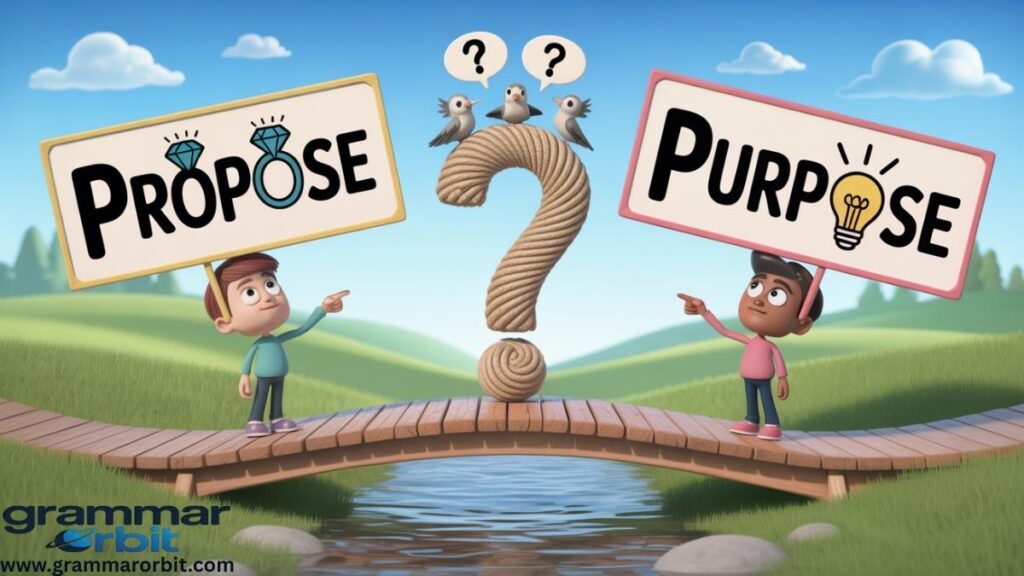
Understanding the propose vs purpose difference comes down to one simple rule:
- Propose = Action. You’re putting something forward.
- Purpose = Reason. You’re explaining why something happens.
In short:
- You propose a plan.
- You have a purpose for that plan.
Propose acts, purpose motivates.
Word Origins and Etymology
Understanding where these words come from helps explain why they behave differently.
- Propose comes from the Latin proponere, meaning “to put forward.” It emphasizes action offering or suggesting something.
- Purpose comes from Old French purpos, meaning “intention or aim.” It focuses on the reason behind an action.
So, one word pushes ideas out (propose), the other pulls meaning in (purpose).
Deep Dive: Meaning and Usage of “Propose”
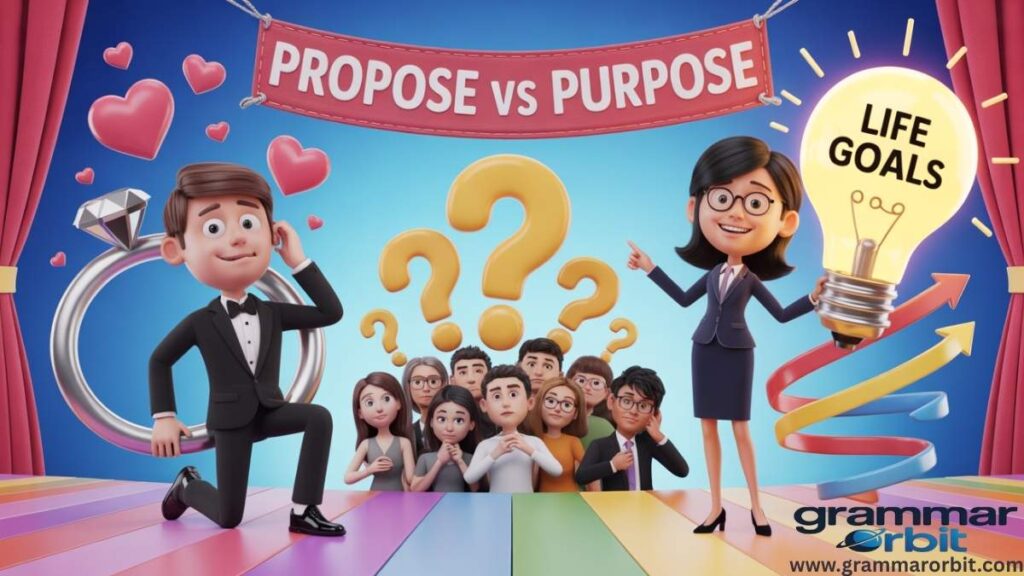
Common Contexts
You’ll encounter propose in situations where someone is suggesting or offering something:
- Meetings and discussions: “I propose we move on to the next topic.”
- Projects and plans: “The engineer proposed a design upgrade.”
- Personal intentions: “They propose to finish ahead of schedule.”
- Romantic gestures: “He proposed to her during dinner.”
Grammar and Structure
Propose is a verb and often followed by:
- A noun → “I propose a toast.”
- A that-clause → “They proposed that we revise the plan.”
- An infinitive (to + verb) → “We propose to expand operations.”
Common Collocations
- propose a plan
- propose a solution
- propose marriage
- propose a toast
Example Sentences
- The committee proposed several changes to improve efficiency.
- I propose we end this meeting before lunch.
- The scientists proposed a new model for testing the data.
Passerby Passersby or Passerbyers? Which One Is Correct?
Deep Dive: Meaning and Usage of “Purpose”
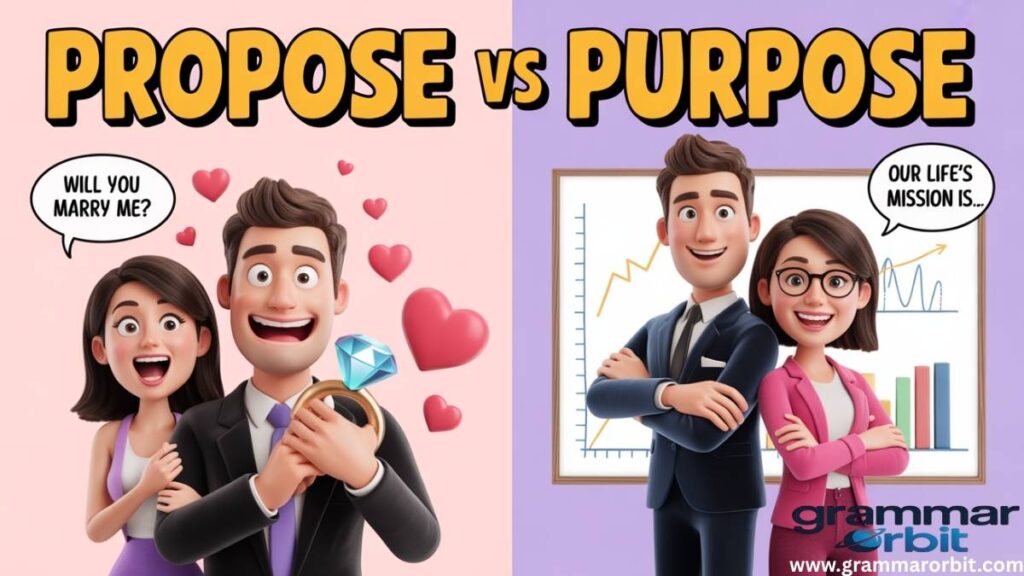
Common Contexts
You use purpose when talking about intentions, goals, or reasons:
- Motivation: “Her purpose in life is to help others.”
- Function: “The purpose of this device is to measure speed.”
- Intentionality: “He did it on purpose.”
- Corporate or academic goals: “The purpose of this research is to find solutions.”
Grammar and Structure
Purpose functions mainly as a noun. It can appear in several structures:
- Purpose of + noun/verb-ing → “The purpose of studying is to learn.”
- With the purpose of + verb-ing → “He acted with the purpose of saving time.”
- On purpose → “She spilled coffee on purpose.”
Related Expressions
- Serve a purpose: “This rule still serves a purpose.”
- For a purpose: “Everything happens for a purpose.”
- Purpose-built: “This vehicle is purpose-built for off-road driving.”
Example Sentences
- The purpose of the experiment was to prove the hypothesis.
- He speaks with a sense of purpose and confidence.
- Every decision should have a clear purpose behind it.
Ong Meaning in Text: A Complete Guide for Online Users
Propose vs Purpose Side by Side Compariso
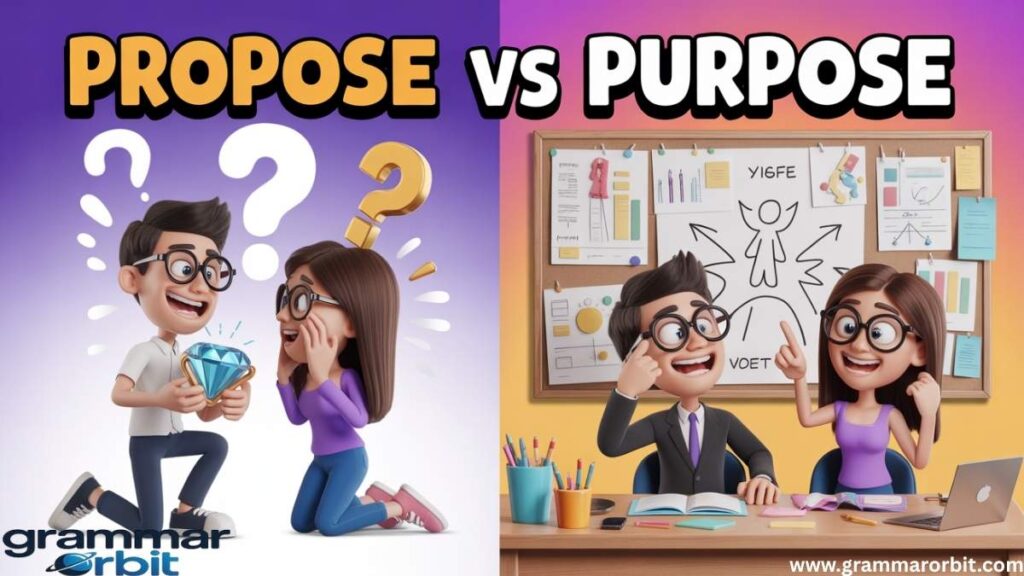
| Feature | Propose | Purpose |
|---|---|---|
| Part of Speech | Verb | Noun |
| Function | To suggest or offer | To explain the reason or intent |
| Focus | Action or idea | Motivation or goal |
| Example | “I propose a new strategy.” | “The purpose of this strategy is success.” |
| Common Mistake | Using as a noun | Using as a verb |
Contexts and Examples
For Students
- Propose: “In this paper, I propose a new theory about memory.”
- Purpose: “The purpose of this research is to test that theory.”
Teachers
- Propose: “Let’s propose a group project for next week.”
- Purpose: “The purpose of this activity is to build teamwork.”
Professionals
- Propose: “We propose extending our services to new regions.”
- Purpose: “Our company’s purpose is to make technology accessible.”
Takeaway: You propose something to be done; you define a purpose for doing it.
Common Mistakes and How to Avoid Them
Mistake 1: Using “purpose” as a verb
❌ “I purpose to finish my assignment today.”
✅ “I propose to finish my assignment today.”
Mistake 2: Using “propose” when explaining motivation
❌ “The propose of this meeting is to plan ahead.”
✅ “The purpose of this meeting is to plan ahead.”
Mistake 3: Confusing “Propose vs Purpose”
❌ “The proposal of our company is to inspire.”
✅ “The purpose of our company is to inspire.”
Tip: Proposal means a plan or suggestion; purpose means the reason for that plan.
Using Each Correctly Propose vs Purpose
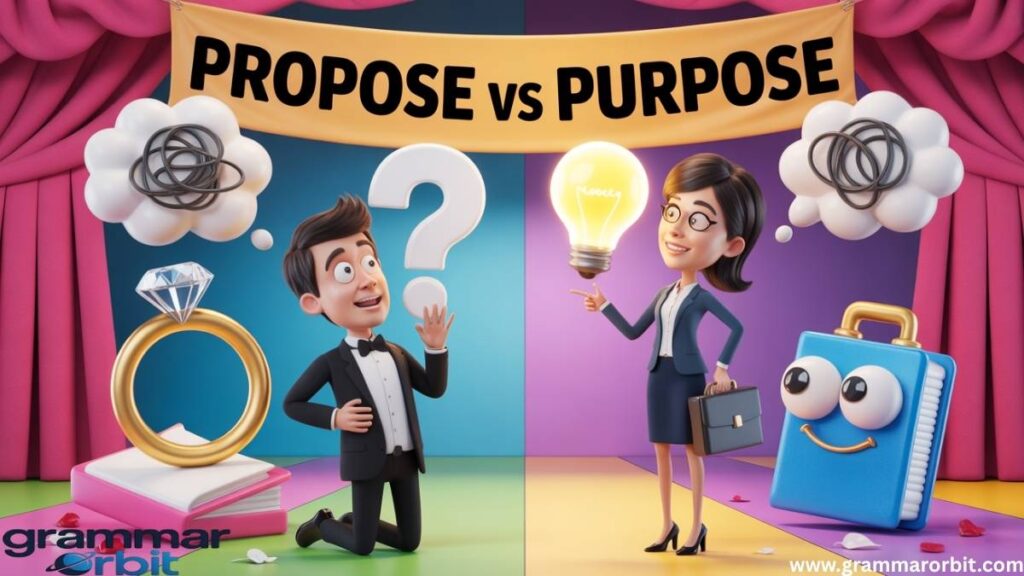
Propose Verb Patterns
- Propose + noun: I propose a new idea.
- Propose + that + clause: He proposed that we revise the policy.
- Propose + to + verb: We propose to improve performance.
Purpose Noun Patterns
- Purpose + of + noun/verb ing: The purpose of training is improvement.
- On purpose: He ignored me on purpose.
- For a purpose: These tools were designed for a purpose.
Example Comparison
| Incorrect | Correct |
|---|---|
| I purpose we meet soon. | I propose we meet soon. |
| The propose of this plan is unclear. | The purpose of this plan is unclear. |
Academic and Professional Applications
Academic Writing
- “In this study, we propose a framework for data analysis.”
- “The purpose of this study is to identify learning barriers.”
Business Context
- “We propose a partnership to expand operations.”
- “Our purpose is to innovate responsibly.”
Creative Writing
- “She proposed a daring adventure.”
- “His purpose became clearer with each step.”
These examples highlight the grammar difference between propose and purpose in real writing.
How to Remember the Difference Propose vs Purpose
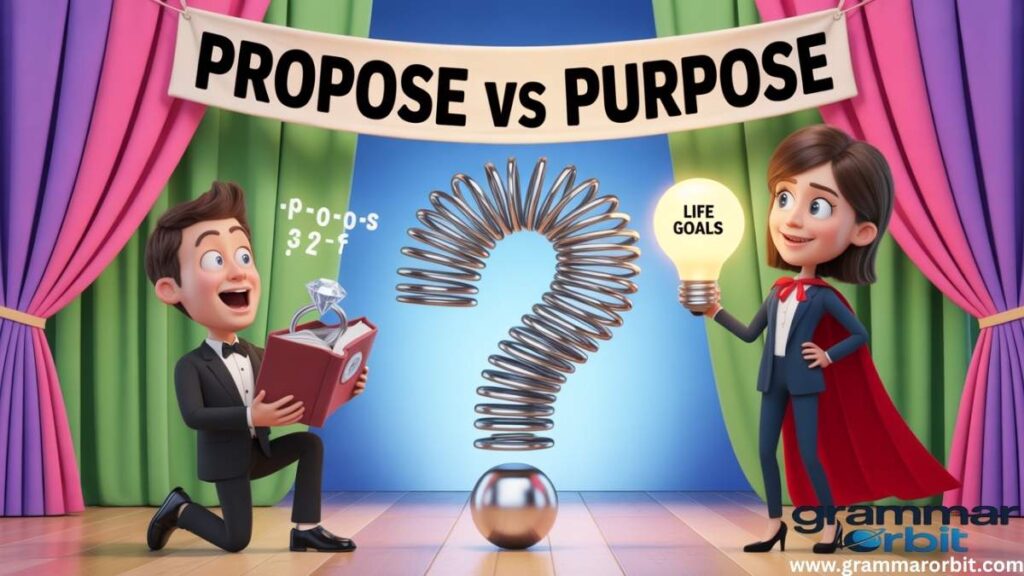
Mnemonics
- Propose → Pose an idea (suggest something).
- Purpose → The point or reason (why something happens).
Simple Memory Tip
Ask yourself:
“Am I suggesting something or explaining why something exists?”
If you’re suggesting → Propose
If you’re explaining why → Purpose
Mini Qui
Choose the correct word: propose or purpose
- The of this project is to improve safety.
- I we take a break.
- Their main is to help others.
- We building a new branch.
- The of this machine is to save time.
Answers: 1. purpose 2. propose 3. purpose 4. propose 5. purpose
Reference: Cambridge Dictionary Definitions
Here’s a trusted source for clear word meanings:
FAQs Propose vs Purpose
What is the difference between purpose and propose?
The main difference between purpose and propose lies in their grammatical function and meaning.
- Propose is a verb, meaning to suggest, offer, or put forward an idea or plan.
Example: “I propose we start early tomorrow.” - Purpose is a noun, meaning the reason or goal behind an action.
Example: “The purpose of the meeting is to discuss progress.”
In short, you propose an idea, but you have a purpose for it.
What is the difference between Propose vs Purpose?
The difference between propose and proposal is that one is an action, and the other is the result of that action.
- Propose (verb): to put forward an idea or plan.
- Proposal (noun): the written or spoken suggestion that comes from proposing something.
Example:
“I propose a new policy.” → “My proposal outlines the new policy.”
What’s the difference between Propose vs Purpose?
The difference between propose and suggest lies in formality and intent.
- Propose often implies a formal or serious suggestion, sometimes requiring approval.
Example: “He proposed a new business strategy.” - Suggest is less formal and can apply to casual or everyday recommendations.
Example: “She suggested trying a different restaurant.”
So, while every proposal is a suggestion, not every suggestion qualifies as a proposal.
When to use propose in a sentence?
Use propose when you want to:
- Present an idea or plan: “I propose we launch next week.”
- Make a formal offer: “The board proposed a merger.”
- Ask for marriage: “He proposed to her at dinner.”
- Introduce a topic or motion: “I propose a toast to our success!”
It’s best used when your intention involves putting something forward be it an idea, plan, or romantic question.
What is a Propose vs Purpose?
A proposal is a formal or structured plan or suggestion, often made in writing or speech, to persuade others to approve or support something.
The purpose of a proposal is to:
- Present an idea clearly and convincingly.
- Offer solutions or plans for consideration.
- Gain approval or agreement for a project, action, or partnership.
Example:
A business proposal aims to secure investment, while a research proposal outlines the purpose and methods of a study.
Conclusion
And that wraps up the battle of Propose vs Purpose two words that sound like twins but act nothing alike. You propose when you suggest something, and you have a purpose when you mean something. Simple, right? Yet, mix them up and you might find yourself proposing your purpose instead of stating your plan which sounds more like a motivational speech than grammar mastery.
So here’s the deal: Propose = action. Purpose = reason. Keep them in their lanes, and your sentences will thank you. Grammar confusion defeated, clarity restored, and your English just leveled up.
JHON AJS is an experienced blogger and the creative voice behind the website grammarorbit.com, namely Grammar Orbit. With a keen eye for language and a passion for wordplay, he creates engaging grammar insights, word meanings, and clever content that make learning English enjoyable and interesting for readers.






